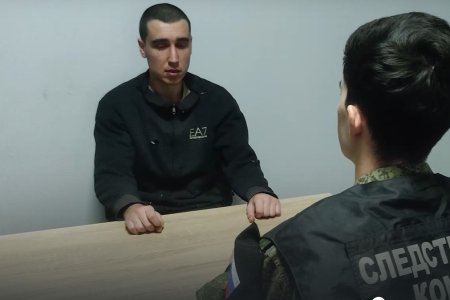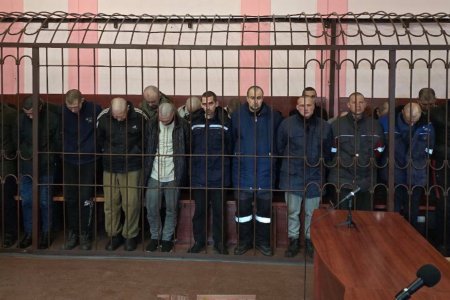
A court in Russia has sentenced Mykola Oliynyk to 14 years’ maximum-security imprisonment more than a year after the 61-year-old who was already undergoing treatment for stomach cancer was abducted from his home in occupied Zaporizhzhia oblast. ‘Judge’ Vitaly Viktorovich Mamedov from the notorious Southern District Military Court can have been in no doubt that he was passing a death sentence on the gravely ill Ukrainian, with this despite the illegality of any ‘trial’, Oliynyk’s account of the methods used to get him to ‘confess’ and the lack of proof to back the specific charges laid.
It is not clear whether the Russians who abducted Oliynyk knew of his cancer diagnosis, but the Russian ‘investigator’, prosecutor and ‘court’ certainly did. This is not, however the first time that ‘judges’ from this same court have handed down horrific sentences against men who are not only innocent, but have conditions which, even by Russian law, mean they cannot be imprisoned. Russia has, in this way, already caused the death of at least three Ukrainian political prisoners – Crimean Tatar civic activist Dzhemil Gafarov, Kostiantyn Shyrinh and 71-year-old Victor Demchenko, as well as prisoners of war and civilian hostages, including 27-year-old journalist Victoria Roshchyna, Mariupol defender Oleksandr Ishchenko, and many others. It is currently jeopardizing the life of a number of political prisoners including Crimean Solidarity civic journalist Amet Suleimanov and, probably, Oleksandr Sizikov, who is blind and severely disabled.
In the present case, the Russian prosecution claimed that Oliynyk had planned to kill a local collaborator, Volodymyr Matsak, whom the Russian invaders had installed as ‘head’ of the occupation ‘Veselivsky raion administration’ in Zaporizhzhia oblast. Since Matsak is still alive, it seems likely that this is part of a familiar genre in which the FSB claim to have ‘thwarted’ planned acts of sabotage or political assassinations. Such claims are generally backed only by ‘confessions’ extracted while a person was held incommunicado or by ‘secret witnesses’ whose testimony cannot be verified. In virtually all such cases, the person is claimed to have been acting on instructions from Ukraine’s Security Service [SBU] or Military Intelligence.
Here the prosecution asserted that Oliynyk had been cooperating with the SBU since July 2022. The ‘evidence’ for this was almost certainly only Oliynyk’s ‘confession’ after he was seized in October 2023. The Memorial Support for Political Prisoners Project has provided reports from some of the court hearings. These make it clear that Oliynyk’s testimony in court differed significantly from that extracted, while in FSB custody and without the presence of an independent lawyer.
While speaking by video link from the notorious SIZO [remand prison] No. 2 in Taganrog on 7 October 2024, Oliynyk did suggest that an attempt was made to recruit him, but insisted that he had made it clear that he would have nothing to do with killing anybody. After the prosecutor insisted on reading out Oliynyk’s earlier ‘confession’, Oliynyk stated that he had not read the document he signed, but had been told by the so-called lawyer provided by the prosecution, that all was fine. It was anything but fine since, as Oliynyk told the court, the document had omitted Oliynyk’s clear statement that he had refused to have anything to do with killing anybody.
For the next hearing, the prosecutor brought in the ‘investigator’ who had originally interrogated Oliynyk in order that this individual deny that any pressure had been brought to bear on Oliynyk and to claim that ‘a lawyer’ had been present and that no complaints had been made about the protocols. We know from numerous cases where political prisoners have finally been able to see independent lawyers or have been released in prisoner exchanges, that the ‘lawyers’ provided by the ‘investigators’ are there essentially only to push the person into signing ‘confessions’. I several cases, they are known to have said nothing while the person was tortured in front of them.
Russia is an occupying state and is prohibited by international law from applying its legislation on occupied Ukrainian territory and from illegally taking Ukrainians to Russia. Even had the claim that Oliynyk was planning to kill Matsak been true, Russia would have had no right to abduct him and stage a fake trial. Nor would there be any grounds for claiming that an attempt on Matsak, a collaborator working for the aggressor state, had constituted ‘terrorism’.
Yet Oliynyk was accused of ‘planning a terrorist attack' under Article 205 § 3b of Russia’s criminal code; of involvement in a ‘terrorist organization (Article 205.4 § 2) and possession of explosives or weapons, under Article 222 § 4.
On 23 January 2025, Mamedov issued an essentially predetermined ‘guilty’ verdict. Oliynyk was sentenced to three years in a prison, the worst of Russian penal institutions, with the remainder of the 14-year sentence in a maximum-security prison colony. Mamedov also imposed a steep fine of 200 thousand roubles.



